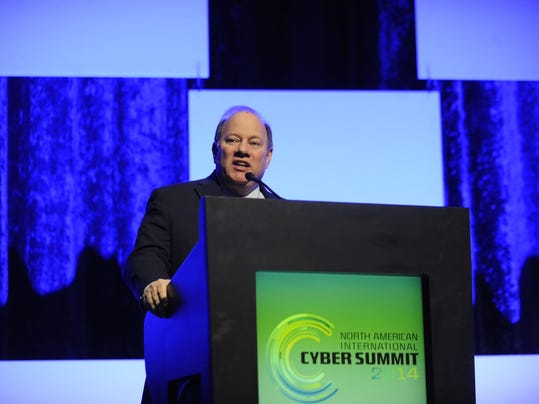
Detroit — Mayor Mike Duggan detailed Monday how Detroit has been victimized by cyber crimes, including how a city database was frozen in April and held for ransom.
Duggan said the city database was held hostage for a ransom of 2,000 bitcoins, an encrypted digital currency. A bitcoin is currently worth $401.75, making that ransom worth $803,500. Duggan said the ransom was not paid and the database wasn’t used or needed by the city.
“It was a good warning sign for us,” he said at Michigan’s third summit focusing on cyber security issues in government, business and other sectors at the North American International Cyber Summit at Cobo Center.
Duggan also noted Monday that a person involved in Detroit’s historic bankruptcy case recently was the victim of a cyber attack that involved threatening emails and a “significant” amount of money taken from a personal checking account.
“The timing was such that he certainly thought it was a political agenda,” the mayor said.
The attack was one of several examples Duggan gave of the city’s lack of updated technology and security.
“It was pretty disturbing what I found,” said Duggan, who began his four-year term as mayor Jan. 1. “I found the Microsoft Office system we had was about 10 years old and couldn’t sync the calendar to my phone.”
The city is in the process of improving security and updating technologies, including recently switching to a faster email system, said the mayor, a former CEO of the Detroit Medical Center.
“We’re in the early stages of ramping up,” he said. “The stakes in play in the state and in the country are enormous.”
Other featured speakers at the summit include Gov. Rick Snyder, former Homeland Security Secretary Michael Chertoff, military leaders and private-sector analysts. Experts from across the country will also talk about trends and best practices in cyber security.
Data theft and security breaches can be costly, both to businesses and the government. According to the state, the Michigan government suffers more than 500,000 computer attacks each day, including spam, Web browser attacks and network intrusion.
Snyder in his keynote speech Monday said an increasingly connected world leaves the private sector vulnerable to cyber attacks.
“Twenty years from now, your car is going to be driving itself,” he said. “The vehicle will be talking to other vehicles, making decisions on when to stop and when to brake.”
A hacker could gain access to that system and control a vehicle from the outside, Snyder said.
“The risks we have today are only going to dramatically increase,” he said.
Snyder also said he thinks businesses and nonprofit groups are more vulnerable to an attack than the government.
“The easiest way to disrupt our world is to go through the private sector,” he said.
Snyder stressed civilian involvement to combat this risk.
“We need to get everyone involved, not just the government,” he said. “It’s the private sector, the individuals all learning more about cyber security.”
In his speech, Snyder unveiled the Michigan Cyber Initiative 2015, outlining steps needed to protect the state from growing threats of cyber attacks.
He announced an expansion to the Cyber Civilian Corp., a group of volunteers from the private sector trained to respond to a cyber attack.
The group first was announced last year at the cyber summit.
“I’m glad to say within the next few months, we’ll have a dozen teams,” Snyder said.
Snyder compared the corps to the Army National Guard.
“It makes sense to use a model that we’ve used for 200-plus years in this country,” he said. “It’s the citizen cyber solider concept.”
Snyder also highlighted the Cyber Command Center with the Michigan State Police, designed to coordinate state efforts to monitor cyber threats.
“Just like we have a Michigan intelligence operation for physical crimes, now we’ve done that for cyber crimes,” he said.
Snyder also spoke about the Michigan Cyber Range, created in 2012 to allow people to train and take cyber security certification courses.
Following his speech, Snyder told reporters it was a matter of time before a significant cyber attack hits the state.
“It’s just a ‘when’ question,” he said. “That’s the point of us being prepared and that’s why I’m so proud to say Michigan is a leader in being prepared.”
Snyder also briefly touched on topics other than cyber security, including his hope to get a road funding bill on his desk by the end of the year. The state Senate approved a boost of more than $1 billion in state road money Thursday with a change to Michigan's fuel tax that is certain to raise the price at the pump. The gas tax increase bill will now go to the Republican-controlled House.
“There’s still quite a bit of work to be done on the House side of this,” he said. “But if you look at the Senate, work was done in a great bipartisan fashion and I hope we can replicate that in the House.”
He also addressed his upcoming fourth annual trip to China.
“It’s about jobs here in Michigan,” he said. “How can we get more exports to China, how can we get more Chinese investment in Michigan, and how we can continue working together to build a strong economic relationship?”
Snyder said that while there have been “multiple” investments from China into the Michigan auto industry, he also is looking into other fields.
“We’re looking to broaden that into other fields (like) agricultural exports,” he said. “We’re the second most diverse state in the nation; most Michiganders don’t even recognize that.”
No comments:
Post a Comment